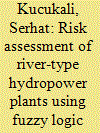|
|
|
Sort Order |
|
|
|
Items / Page
|
|
|
|
|
|
|
| Srl | Item |
| 1 |
ID:
128349


|
|
|
|
|
| Publication |
2014.
|
| Summary/Abstract |
Turkey has recently initiated a project to revise its nuclear policy. The revised nuclear energy policy considers searching for possible alternative locations for future nuclear power plants in Turkey. At the most basic level, the public cannot accurately evaluate whether it is willing to support nuclear energy unless it has an idea about where the power plants are likely to be located. It is argued that the selection of a facility location is a multi-criteria decision-making problem including both quantitative and qualitative criteria. In this research, given the multi-criteria nature of the nuclear facility location selection problem, a new decision tool is proposed to rank the alternative nuclear power plant sites in Turkey. The proposed tool is based on fuzzy Entropy and t norm based fuzzy compromise programming to deal with the vagueness of human judgments. Finally, a discussion and some concluding remarks are provided.
|
|
|
|
|
|
|
|
|
|
|
|
|
|
|
|
| 2 |
ID:
109710


|
|
|
|
|
| Publication |
2011.
|
| Summary/Abstract |
In this paper, a fuzzy rating tool was developed for river-type hydropower plant projects, and risk assessment and expert judgments were utilized instead of probabilistic reasoning. The methodology is a multi-criteria decision analysis, which provides a flexible and easily understood way to analyze project risks. The external risks, which are partly under the control of companies, were considered in the model. A total of eleven classes of risk factors were determined based on the expert interviews, field studies and literature review as follows: site geology, land use, environmental issues, grid connection, social acceptance, macroeconomic, natural hazards, change of laws and regulations, terrorism, access to infrastructure and revenue. The relative importance of risk factors was determined from the survey results. The survey was conducted with the experts that have experience in the construction of river-type hydropower schemes. The survey results revealed that the site geology and environmental issues were considered as the most important risks. The new risk assessment method enabled a Risk Index (R) value to be calculated, establishing a 4-grade evaluation system. The proposed risk analysis will give investors a more rational basis to make decisions and it can prevent cost and schedule overruns.
|
|
|
|
|
|
|
|
|
|
|
|
|
|
|
|
| 3 |
ID:
094939


|
|
|
|
|
| Publication |
2010.
|
| Summary/Abstract |
This paper aims to forecast Turkey's short-term gross annual electricity demand by applying fuzzy logic methodology while general information on economical, political and electricity market conditions of the country is also given. Unlike most of the other forecast models about Turkey's electricity demand, which usually uses more than one parameter, gross domestic product (GDP) based on purchasing power parity was the only parameter used in the model. Proposed model made good predictions and captured the system dynamic behavior covering the years of 1970-2014. The model yielded average absolute relative errors of 3.9%. Furthermore, the model estimates a 4.5% decrease in electricity demand of Turkey in 2009 and the electricity demand growth rates are projected to be about 4% between 2010 and 2014. It is concluded that forecasting the Turkey's short-term gross electricity demand with the country's economic performance will provide more reliable projections. Forecasting the annual electricity consumption of a country could be made by any designer with the help of the fuzzy logic procedure described in this paper. The advantage of this model lies on the ability to mimic the human thinking and reasoning.
|
|
|
|
|
|
|
|
|
|
|
|
|
|
|
|
|
|
|
|
|